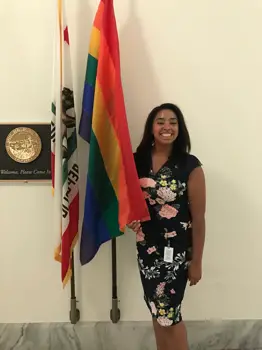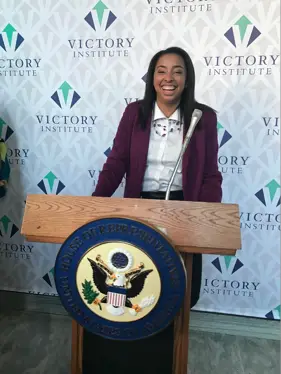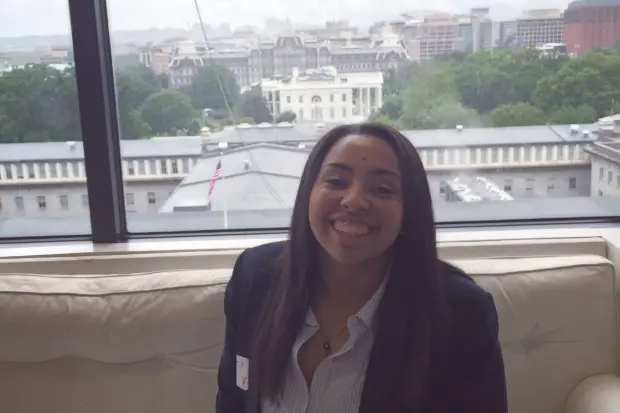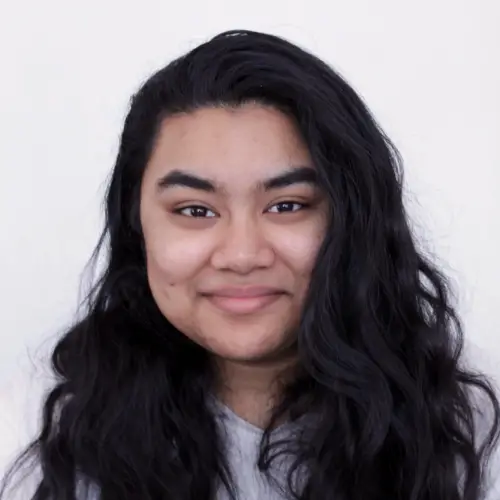Alicia Cannon knew she wanted to do greater things with politics after taking her first political high school class, AP American Government. She recalls that before taking that class, she never truly cared about any course material.
AP American Government, however, interested her, and she became enthralled with the political system, which prompted her dream of becoming a future activist or politician, perhaps even a female president.
The Villanova University Junior is currently double majoring in political science and theology and is unapologetically changing the game and leaving a legacy in her wake.
Her passion and drive have led her to successful internships, including a job as an administrative and legislative intern for Congressman Alan Lowenthal and a position as a Victory Institute Congressional Intern, which puts her one step closer to being a female president one day.
Additionally, Cannon was elected by student delegates to be the co-director of SAC BACCHUS Initiatives of NASPA, where she served as the liaison between the national staff and the student representatives. She says, “I’m politically active because I feel a civic duty to people politically involved.”
Cannon is furthermore a member and advocate for the LGBTQ+ community, seeking to bring more awareness and action to queer rights. Being a representative in a predominantly conservative school has definitely taken courage, but she finds that it has been a rewarding experience.

Cannon has had a notable experience advocating for what she does at Villanova, a private Catholic institution. In fact, she has had mixed reviews and reactions from her peers. She laments, “It depends on the crowd. I can be the crazy liberal with wild ideas, or when I’m around very liberal-minded people, I’m the mean conservative. So I realized that I just can’t win.”
That said, she does not regard the varied perceptions as a particularly negative obstacle; instead, she views them as a reason to try harder at what she does. As a result, she remains confident in her abilities and interpersonal skills.
To describe her confidence in her political endeavors, she says, “The only way for me to win is if I know my opinions and the logic behind them. I can have an intelligent conversation and admit if I’m wrong or flawed. There’s no right answer. If there was a right answer, it’d be solved by now. So it’s more taking pride in knowing that I have the intellectual stamina to back up my thoughts.”
Though she is a black, biracial and queer woman, Cannon expresses that she does not let her attributes necessarily define her. Most people might consider her characteristics to be a triple threat or things she should flaunt and use as an opening pitch, but Cannon believes that they’re normal aspects that create her identity.
She says, “It was hard at first, being separated into being a woman, being a black woman and being a gay black woman, but I’m Alicia first and foremost.”
Cannon also advocates for more religious representation within the LGBTQ+ community, although she says the two are not mutually exclusive. Growing up Catholic all of her life and discovering her sexual identity at a later date made for a confusing and stressful period of time.
However, she believes that people in both communities should have no reason to avoid identifying with being both religious and queer, and she intends to be a peak role model for those individuals. At the end of the day, the representation she projects is simply inspirational.
A particular instance of vulnerability Cannon has experienced is when a girl on campus was attacked for the color of her skin. Cannon recalls her upbringing prior to the incident, pointing out that she had never thought about discrimination on that scale until then. To be in that girl’s position was uncharted territory, and she remains humbled by the second-hand experience.
Even though she is potentially changing the game at Villanova by being a person of color and advocating for more outspoken topics, Cannon maintains that above all else, she is simply a normal college kid. She ultimately remains open-minded to everyone and everything, a skill acquired for future politicians to hear the thoughts and opinions of the people.
She says, “I’m just in the middle trying to have conversations with people and trying to pick apart their minds. I don’t judge them later. That’s your opinion…[and] there’s nothing I can really say or do to change that.”

Furthermore, some concerns that arise are regrettably the practicality of her chosen career path, which may not earn her a sufficient amount of money in the long run. She goes on to express that while her parents are proud of her involvement and majors, they also worry about whether or not she has made a lucrative choice.
Civil rights is a hard field to get paid in, unless you’re involved in a corporate field. However, Cannon is content with what she has achieved and where she is positioned. In fact, she claims to be one of the lucky ones.
Unfortunately, the current political climate is undesirable to a large portion of the population. For those who are displeased, Cannon has a few strong words of advice. She states, “We have four years to make changes. Call your congressman every day; if that doesn’t work, write a letter.”
Cannon draws inspiration for her current political attitude from the recent Parkland, Florida, school shooting and the immediate involvement and call-to-action the students there initiated.
The fact that they managed to get major news broadcasting stations to come down so they could receive the amount of coverage and attention they needed in order to spread their message is what Cannon wants to achieve in her day-to-day life. She describes the power of students, herself included, as a power of passion that can enable them to achieve anything.
After graduation, Cannon says that she wants to start local and work her way up the political chain. She says, “Whatever I do, I want to care. I don’t want to be stuck at a job where I’m just there because I need to make money.” Becoming the first biracial, queer and female president is not far off on her list of goals to accomplish in her lifetime.
From a realistic standpoint, Cannon does not remain ignorant of the hardships her dream of one day becoming president may entail. With a hint of positivity, she conveys, “It depends, actually, on money and backers. A more realistic goal is local government, but I mean, why can’t it be achievable?”
Her optimism is sure to take her a long way, and she will likely continue paving the way for future equality.

















